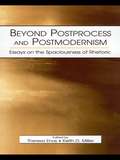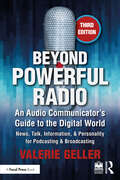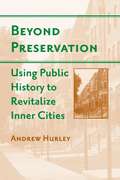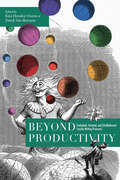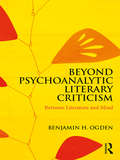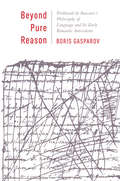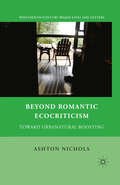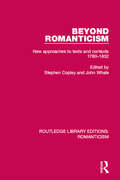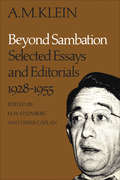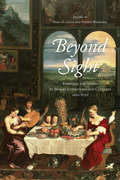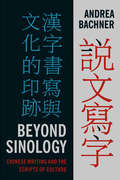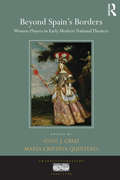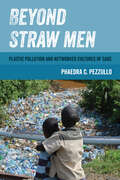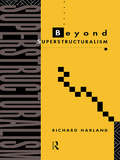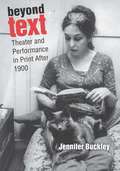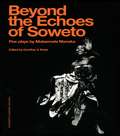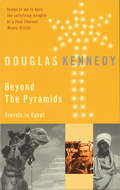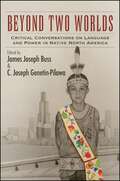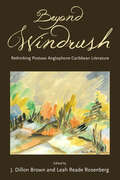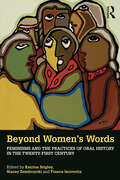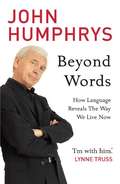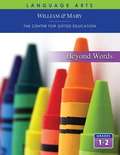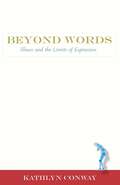- Table View
- List View
Beyond Postprocess and Postmodernism: Essays on the Spaciousness of Rhetoric
by Theresa Enos Keith D. MillerIn this collection of original essays, editors Theresa Enos and Keith D. Miller join their contributors--a veritable "who's who" in composition scholarship--in seeking to illuminate and complicate many of the tensions present in the field of rhetoric and composition. The contributions included here emphasize key issues in past and present work, setting the stage for future thought and study. The book also honors the late Jim Corder, a major figure in the development of the rhetoric and composition discipline. In the spirit of Corder's unfinished work, the contributors to this volume absorb, probe, stretch, redefine, and interrogate classical, modern, and postmodern rhetorics--and challenge their limitations. Beyond Postprocess and Postmodernism: Essays on the Spaciousness of Rhetoric will be of interest to scholars, teachers, and students in rhetoric and composition, English, and communication studies. Offering a provocative discussion of postprocess composition theories and pedagogies and postmodern rhetorics, as well as the first thorough consideration of Jim Corder's contributions, this work is certain to influence the course of future study and research.
Beyond Powerful Radio: An Audio Communicator’s Guide to the Digital World - News, Talk, Information, & Personality for Podcasting & Broadcasting
by Valerie GellerA complete guide to becoming a successful communicator, Beyond Powerful Radio teaches time-tested techniques that work in any format – radio, TV, podcast, or online.Learn how to get, keep, and grow audiences with powerful storytelling, and become a dynamic presenter. This book holds the tools needed to create winning content; tell compelling stories; build your brand; develop talent; produce a show; report the news; sell; and write commercials. Practical tips and methods from over 50 top experts from across the world of media illuminate interviewing, managing talent, becoming an authentic personality, and getting started in the business. This fully revised edition features new sections on: Podcasting: what you need to know to create, market, and produce on-demand audio. Social media: a guide to best use and social media safety. Storytelling: an introduction to the “Prism” method, Story Spine, and other proven easy-to-try techniques designed to compel audiences. Artificial Intelligence: how to harness AI in audio and visual media according to experts. Synergy across all platforms: tips and techniques to work effectively across all media formats. Whether you’re a professional with years in the industry, an instructor with a class full of media hopefuls, or you are just starting out as a podcaster or radio host, this book will help you reach your goals.A full Instructor Manual is available with complete lesson plans for broadcast instructors. The Instructor Manual is available for download here: http://routledgetextbooks.com/textbooks/instructor_downloads.
Beyond Preservation: Using Public History to Revitalize Inner Cities
by Andrew HurleyA framework for stabilizing and strengthening inner-city neighbourhoods through the public interpretation of historic landscapes
Beyond Productivity: Embodied, Situated, and (Un)Balanced Faculty Writing Processes
by Kim Hensley Owens Derek Van IttersumIn Beyond Productivity, a wide range of contributors share honest narratives of the sometimes-impossible conditions that scholars face when completing writing projects. The essays provide backstage views of the authors' varying approaches to moving forward when the desire to produce wanes, when deciding a project is not working, when working within and around and redefining academic productivity expectations, and when writing with ever-changing bodies that do not always function as expected. This collection positions scholarly writers' ways of writing as a form of flexible, evolving knowledge. By exhibiting what is lost and gained through successive rounds of transformation and adaptation over time, the contributors offer a sustainable understanding and practice of process—one that looks beyond productivity as the primary measure of success. Each presents a fluid understanding of the writing process, illustrating its deeply personal nature and revealing how fragmented and disjointed methods and experiences can highlight what is precious about writing. Beyond Productivity determines anew the use and value of scholarly writing and the processes that produce it, both within and beyond the context of the losses, constraints, and adaptations associated with the COVID-19 pandemic.
Beyond Psychoanalytic Literary Criticism: Between Literature and Mind
by Benjamin H. OgdenThrough a series of radical and innovative chapters, Beyond Psychoanalytic Literary Criticism: Between Literature and Mind challenges the tradition of applied psychoanalysis that has long dominated psychoanalytic literary criticism. Benjamin H. Ogden, a literary scholar, proposes that a new form of analytic literary criticism take its place, one that begins from a place of respect for the mystery of literature and the complexity of its inner workings. In this book, through readings of authors such as J.M. Coetzee, Flannery O’Connor, and Vladimir Nabokov, the mysteries upon which literary works rely for their enduring power are enumerated and studied. Such mysteries are thereafter interwoven into a series of pioneering studies of how the conceptions of thinking, dreaming, and losing become meaningful within the unique aesthetic conditions of individual novels and poems. Each chapter is a provisional solution to the difficult "bridging problems" that arise when literary figures work in the psychoanalytic space, and when psychoanalysts attempt to make use of literature for analytic purposes. At every turn, Beyond Psychoanalytic Literary Criticism: Between Literature and Mind acts as a living example of the territory it explores: the space between two disciplines, wherein the writer brings into being a form of psychoanalytic literary criticism of his own making. Forgoing traditional applied psychoanalysis and technical jargon, this highly accessible, interdisciplinary work will appeal to psychoanalysts and psychoanalytic psychotherapists, as well as literary critics and scholars.
Beyond Pure Reason: Ferdinand de Saussure's Philosophy of Language and Its Early Romantic Antecedents (Leonard Hastings Schoff Lectures)
by Boris GasparovThe Swiss linguist Ferdinand de Saussure (1857–1913) revolutionized the study of language, signs, and discourse in the twentieth century. He successfully reconstructed the proto-Indo-European vowel system, advanced a conception of language as a system of arbitrary signs made meaningful through kinetic interrelationships, and developed a theory of the anagram so profound it gave rise to poststructural literary criticism.The roots of these disparate, even contradictory achievements lie in the thought of Early German Romanticism, which Saussure consulted for its insight into the nature of meaning and discourse. Conducting the first comprehensive analysis of Saussure's intellectual heritage, Boris Gasparov links Sassurean notions of cognition, language, and history to early Romantic theories of cognition and the transmission of cultural memory. In particular, several fundamental categories of Saussure's philosophy of language, such as the differential nature of language, the mutability and immutability of semiotic values, and the duality of the signifier and the signified, are rooted in early Romantic theories of "progressive" cognition and child cognitive development. Consulting a wealth of sources only recently made available, Gasparov casts the seeming contradictions and paradoxes of Saussure's work as a genuine tension between the desire to bring linguistics and semiotics in line with modernist epistemology on the one hand, and Jena Romantics' awareness of language's dynamism and its transcendence of the boundaries of categorical reasoning on the other. Advancing a radical new understanding of Saussure, Gasparov reveals aspects of the intellectual's work previously overlooked by both his followers and his postmodern critics.
Beyond Romantic Ecocriticism: Toward Urbanatural Roosting (Nineteenth-Century Major Lives and Letters)
by Ashton NicholsNichols chronicles the Enlightenment view of 'Nature' as static and separate from humans as it moved towards the Romantic 'nature' characterized by dynamic links among all living things. Engaging Romantic and Victorian thinkers, as well as contemporary scholarship, he draws new conclusions about 21st-century ideas of nature.
Beyond Romanticism: New Approaches to Texts and Contexts 1780-1832 (Routledge Library Editions: Romanticism #27)
by Stephen Copley John WhaleFirst published in 1992. Beyond Romanticism represents a substantial challenge to traditional views of the Romantic period and provides a sustained critique of ‘Romantic ideology’. The debates with which it engages had previously been under-represented in the study of Romanticism, where the claims of history had never had quite the same status as they have had in other periods, and where confidence in poetic literary value remains high. Individual essays examine the philosophical underpinnings of Romantic discourse; they survey analogous and competing discourses of the period such as mesmerism, Hellenism, orientalism and nationalism; and analyse both the manifestations of Romanticism in particular historical and textual moments, and the texts and modes of writing which have been historically marginalized or silenced by ‘the Romantic’. This title will be of interest to students of literature.
Beyond Sambation: Selected Essays and Editorials 1928-1955
by A. M. Klein Usher Caplan M. W. SteinbergThe broad range of A.M. Klein’s interests, ideas, and activities is reflected in this selection of articles, editorials, and reviews – a selection that also displays the qualities that distinguished all his creative writing and the highly idiosyncratic nature of his style.The writings in this volume span a most critical juncture in human affairs; a period that witnessed the Great Depression, the rise of fascism, Nazism, and communism, the Second World War, and the emergence of the State of Israel. As a journalist, Klein did more than record the events – he gave expression to the feelings of his people and helped shape their responses. His wide reading, sensitivity, and intelligence made him a perceptive observer and keen analyst, while his command of language, his passion, rhetoric, and wit, made him an eloquent spokesman. These qualities enabled him to carry out the responsibilities, as he saw them, of chronicler and champion. Though Klein’s major concern was with the Canadian Jewish scene, his interests were part of the mosaic of Canadian history and his work forms a chronicle and a commentary on events of world-wide significance. Klein’s journalism relates frequently, in both substance and language, to his poems and fiction, and thus provides a context for the study of his creative writing. It also reveals aspects of his personality, values, and commitments, contributing to our understanding and appreciation of one of Canada’s foremost writers.
Beyond Sight: Engaging the Senses in Iberian Literatures and Cultures, 1200–1750
by Ryan D. Giles Steven WagschalBeyond Sight, edited by Ryan D. Giles and Steven Wagschal, explores the ways in which Iberian writers crafted images of both Old and New Worlds using the non-visual senses (hearing, smell, taste, and touch). The contributors argue that the uses of these senses are central to understanding Iberian authors and thinkers from the pre- and early modern periods. Medievalists delve into the poetic interiorizations of the sensorial plane to show how sacramental and purportedly miraculous sensory experiences were central to the effort of affirming faith and understanding indigenous peoples in the Americas. Renaissance and early modernist essays shed new light on experiences of pungent, bustling ports and city centres, and the exotic musical performances of empire. This insightful collection covers a wide array of approaches including literary and cultural history, philosophical aesthetics, affective and cognitive studies, and theories of embodiment. Beyond Sight expands the field of sensory studies to focus on the Iberian Peninsula and its colonies from historical, literary, and cultural perspectives.
Beyond Sinology: Chinese Writing and the Scripts of Culture (Global Chinese Culture)
by Andrea BachnerNew communication and information technologies provide distinct challenges and possibilities for the Chinese script, which, unlike alphabetic or other phonetic scripts, relies on multiple signifying principles. In recent decades, this multiplicity has generated a rich corpus of reflection and experimentation in literature, film, visual and performance art, and design and architecture, within both China and different parts of the West.Approaching this history from a variety of alternative theoretical perspectives, Beyond Sinology reflects on the Chinese script to pinpoint the multiple connections between languages, scripts, and medial expressions and cultural and national identities. Through a complex study of intercultural representations, exchanges, and tensions, the text focuses on the concrete "scripting" of identity and alterity, advancing a new understanding of the links between identity and medium and a critique of articulations that rely on single, monolithic, and univocal definitions of writing.Chinese writing—with its history of divergent readings in Chinese and non-Chinese contexts, with its current reinvention in the age of new media and globalization—can teach us how to read and construct mediality and cultural identity in interculturally responsible ways and also how to scrutinize, critique, and yet appreciate and enjoy the powerful multi-medial creativity embodied in writing.
Beyond Spain's Borders: Women Players in Early Modern National Theaters (Transculturalisms, 1400-1700)
by Anne J. Cruz María Cristina QuinteroThe prolific theatrical activity that abounded on the stages of early modern Europe demonstrates that drama was a genre that transcended national borders. The transnational character of early modern theater reflects the rich admixture of various dramatic traditions, such as Spain’s comedia and Italy’s commedia dell’arte, but also the transformations across cultures of Spanish novellas to French plays and English interludes. Of particular import to this study is the role that women and gender played in this cross-pollination of theatrical sources and practices. Contributors to the volume not only investigate the gendered effect of Spanish texts and literary types on English and French drama, they address the actual journeys of Spanish actresses to French theaters and of Italian actresses to the Spanish stage, while several emphasize the movement of royal women to various courts and their impact on theatrical activity in Spain and abroad. In their innovative focus on women’s participation and influence, the chapters in this volume illustrate the frequent yet little studied transnational and transcultural points of contact between Spanish theater and the national theaters of England, France, Austria, and Italy.
Beyond Straw Men: Plastic Pollution and Networked Cultures of Care (Environmental Communication, Power, and Culture #4)
by Phaedra C. PezzulloAddressing plastics can feel overwhelming. Guilt, shame, anger, hurt, fear, dismissiveness, and despair abound. Beyond Straw Men moves beyond "hot take" or straw man fallacies by illustrating how affective counterpublics mobilized around plastics reveal broader stories about environmental justice and social change. Inspired by on- and offline organizing in the Global South and the Global South of the North, Phaedra C. Pezzullo engages public controversies and policies through analysis of hashtag activism, campaign materials, and podcast interviews with headline-making advocates in Bangladesh, Kenya, the United States, and Vietnam. She argues that plastics have become an articulator of crisis and an entry point into the contested environmental politics of carbon-heavy masculinity, carceral policies, planetary fatalism, eco-ableism, greenwashing, marine life endangerment, pollution colonialism, and waste imperialism. Attuned to plastic attachments, Beyond Straw Men illustrates how everyday people resist unsustainable patterns of the plastics-industrial complex through imperfect but impactful networked cultures of care.
Beyond Superstructuralism
by Richard HarlandMoving on from his previous book, Superstructuralism , Richard Harland argues that the focus on single words in the structuralist theory of language is its key weakness and that the next advance beyond post-structuralism depends upon replacing word-based with syntagm-based theories. In a lucid way he develops a new syntagmatic theory which shows that the effect of combining words grammatically can transform the very nature of meaning. The wide breadth of coverage in the book covers both post-Chomskyan' linguistics and Derrida, and sets up an opposition to analytic and speech-act views of language. By presenting a systematic critique and counter-proposal, Harland challenges the very foundation of recent literary and language based theory.
Beyond Text: Theater and Performance in Print After 1900
by Jennifer BuckleyTaking up the work of prominent theater and performance artists, Beyond Text reveals the audacity and beauty of avant-garde performance in print. With extended analyses of the works of Edward Gordon Craig, German expressionist Lothar Schreyer, the Living Theatre, Carolee Schneemann, and Guillermo Gómez-Peña, the book shows how live performance and print aesthetically revived one another during a period in which both were supposed to be in a state of terminal cultural decline. While the European and American avant-gardes did indeed dismiss the dramatic author, they also adopted print as a theatrical medium, altering the status, form, and function of text and image in ways that continue to impact both the performing arts and the book arts. Beyond Text participates in the ongoing critical effort to unsettle conventional historical and theoretical accounts of text-performance relations, which have too often been figured in binary, chronological (“from page to stage”), or hierarchical terms. Across five case studies spanning twelve decades, Beyond Text demonstrates that print—as noun and verb—has been integral to the practices of modern and contemporary theater and performance artists.
Beyond The Echoesoweto
by Geoffrey V. Davis Matsemela ManakaFirst Published in 2004. Routledge is an imprint of Taylor & Francis, an informa company.
Beyond The Pyramids: Travels in Egypt
by Douglas KennedyBEYOND THE PYRAMIDS is a delightfully wry chronicle of travels through a country of incongruity - an Egypt encompassing a diversity of cultural influences which often belies its image of 'archaeological theme park'.With an acute eye for the unusual, the interesting or the plain absurd, Douglas Kennedy takes us on a continually surprising tour beyond the pyramids, to a place where Bedouin watch American television in an oasis; where monks in the desert are computer-literate; and where an entire community of Cairo's poor have set up home in a cemetary.'BEYOND THE PYRAMIDS seems to me to have the satisfying insights of a Paul Theroux' Maeve Binchy
Beyond The Pyramids: Travels in Egypt
by Douglas KennedyBEYOND THE PYRAMIDS is a delightfully wry chronicle of travels through a country of incongruity - an Egypt encompassing a diversity of cultural influences which often belies its image of 'archaeological theme park'.With an acute eye for the unusual, the interesting or the plain absurd, Douglas Kennedy takes us on a continually surprising tour beyond the pyramids, to a place where Bedouin watch American television in an oasis; where monks in the desert are computer-literate; and where an entire community of Cairo's poor have set up home in a cemetary.'BEYOND THE PYRAMIDS seems to me to have the satisfying insights of a Paul Theroux' Maeve Binchy
Beyond Two Worlds: Critical Conversations on Language and Power in Native North America (SUNY series, Tribal Worlds: Critical Studies in American Indian Nation Building)
by James Joseph Buss; C. Joseph Genetin-PilawaBeyond Two Worlds brings together scholars of Native history and Native American studies to offer fresh insights into the methodological and conceptual significance of the "two-worlds framework." They address the following questions: Where did the two-worlds framework originate? How has it changed over time? How does it continue to operate in today's world? Most people recognize the language of binaries birthed by the two-worlds trope—savage and civilized, East and West, primitive and modern. For more than four centuries, this lexicon has served as a grammar for settler colonialism. While many scholars have chastised this type of terminology in recent years, the power behind these words persists. With imagination and a critical evaluation of how language, politics, economics, and culture all influence the expectations that we place on one another, the contributors to this volume rethink the two-worlds trope, adding considerably to our understanding of the past and present.
Beyond Windrush: Rethinking Postwar Anglophone Caribbean Literature (Caribbean Studies Series)
by J. Dillon Brown Leah Reade RosenbergThis edited collection challenges a long sacrosanct paradigm. Since the establishment of Caribbean literary studies, scholars have exalted an elite cohort of émigré novelists based in postwar London, a group often referred to as “the Windrush writers” in tribute to the SS Empire Windrush, whose 1948 voyage from Jamaica inaugurated large-scale Caribbean migration to London. In critical accounts this group is typically reduced to the canonical troika of V. S. Naipaul, George Lamming, and Sam Selvon, effectively treating these three authors as the tradition's founding fathers. These “founders” have been properly celebrated for producing a complex, anticolonial, nationalist literature. However, their canonization has obscured the great diversity of postwar Caribbean writers, producing an enduring but narrow definition of West Indian literature. Beyond Windrush stands out as the first book to reexamine and redefine the writing of this crucial era. Its fourteen original essays make clear that in the 1950s there was already a wide spectrum of West Indian men and women—Afro-Caribbean, Indo-Caribbean, and white-creole—who were writing, publishing, and even painting. Many lived in the Caribbean and North America, rather than London. Moreover, these writers addressed subjects overlooked in the more conventionally conceived canon, including topics such as queer sexuality and the environment. This collection offers new readings of canonical authors (Lamming, Roger Mais, and Andrew Salkey); hitherto marginalized authors (Ismith Khan, Elma Napier, and John Hearne); and commonly ignored genres (memoir, short stories, and journalism).
Beyond Women's Words: Feminisms and the Practices of Oral History in the Twenty-First Century
by Franca Iacovetta Katrina Srigley Stacey ZembrzyckiBeyond Women’s Words unites feminist scholars, artists, and community activists working with the stories of women and other historically marginalized subjects to address the contributions and challenges of doing feminist oral history. Feminists who work with oral history methods want to tell stories that matter. They know, too, that the telling of those stories—the processes by which they are generated and recorded, and the different contexts in which they are shared and interpreted—also matters—a lot. Using Sherna Berger Gluck and Daphne Patai’s classic text, Women’s Words, as a platform to reflect on how feminisms, broadly defined, have influenced, and continue to influence, the wider field of oral history, this remarkable collection brings together an international, multi-generational, and multidisciplinary line-up of authors whose work highlights the great variety in understandings of, and approaches to, feminist oral histories. Through five thematic sections, the volume considers Indigenous modes of storytelling, feminism in diverse locales around the globe, different theoretical approaches, oral history as performance, digital oral history, and oral history as community-engagement. Beyond Women’s Words is ideal for students of oral history, anthropology, public history, women’s and gender history, and Women’s and Gender Studies, as well as activists, artists, and community-engaged practitioners.
Beyond Words
by John HumphrysFrom the huge response to Lost for Words, it?s clear that many of us share John?s strong feelings about the use and misuse of the English language. Not because we want to split hairs (or infinitives) but because how we use words reveals so much about the way we see the world.Here John takes a sharp look at phrases and expressions in current use to expose the often hidden attitudes that lie behind them ? from the schoolroom to the boardroom, from Westminster to the weather forecast. Questioning our assumptions, puncturing our illusions and illuminating the way we live now, Beyond Words is a small book that speaks volumes.
Beyond Words
by John Humphrys'Wonderfully spirited' DAILY MAILThe follow-up to the Sunday Times Top 10 bestseller Lost for Words, from Today presenter and national treasure John Humphrys.From the huge response to Lost for Words, it's clear that many of us share John's strong feelings about the use and misuse of the English language. Not because we want to split hairs (or infinitives) but because how we use words reveals so much about the way we see the world.Here John takes a sharp look at phrases and expressions in current use to expose the often hidden attitudes that lie behind them - from the schoolroom to the boardroom, from Westminster to the weather forecast. Questioning our assumptions, puncturing our illusions and illuminating the way we live now, Beyond Words is a small book that speaks volumes.
Beyond Words Student Guide Grades 1-2 (Second Edition)
by The Center for Gifted EducationThere are many poems in this book, as well as Activity Pages related to what you read and learn. During this unit, you will use several teaching models. They include: 1. The Literature Web Model 2. The Metaphor Analysis Model 3. The Vocabulary Web Model 4. The Hamburger Model for Persuasive Writing 5. The Writing Process Model
Beyond Words: Illness and the Limits of Expression (Literature and Medicine Series)
by Kathlyn Conway&“Kathlyn Conway opens primordial questions about the shattering events of illness through close readings of selected illness narratives, proposing that only writing of a daring kind can utter the knowledge of the self-telling body. Wielding her ferocious intellect and braving exposure to self and other, Conway makes original discoveries about writing and illness and, more stunningly, about writing and life. Not a book about illness, this is a book about writing and being. It is taut, brave, unequalled in our scholarship, and true. Conway joins our most powerful investigators of the human predicament of mortality, helping us to see, helping us to live.&”—Rita Charon, Columbia University, Program in Narrative MedicinePublished accounts of illness and disability often emphasize hope and positive thinking: the woman who still looked beautiful after losing her hair, the man who ran five miles a day during chemotherapy. This acclaimed examination of the genre of the illness narrative questions that upbeat approach. Author Kathlyn Conway, a three-time cancer survivor and herself the author of an illness memoir, believes that the triumphalist approach to writing about illness fails to do justice to the shattering experience of disease. By wrestling with the challenge of writing about the reality of serious illness and injury, she argues, writers can offer a truer picture of the complex relationship between body and mind.
